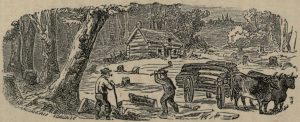
Question 2) Read Susanna Moodie’s introduction to the third edition of Roughing it in the Bush, 1854. Moodie’s introduction is often read as a warning to would be emigrants as well as an explanation of why her family emigrated from Britain. See if you can find echoes of the stories discussed above: a gift from god, a second Garden of Eden, an empty/wasted land, the noble but vanishing Indian, and the magical map. By echoes I mean reading between the lines or explicitly within Moodie’s introduction. Discussing what you discover, use your examples as evidence to write a blog that explores what you think might have been Moodie’s level of awareness of the stories she carried with her. And accordingly, the stories that she “resurrects’ by her appearance in the Dead Dog CafŽ in Green Grass Running Water.
Susanna Moodie’s Roughing it in the Bush is written retrospectively, as we can tell from her moments of self reflection, like when she says,
“Now, when not only reconciled to Canada, but loving it,
and feeling a deep interest in it’s present welfare, and the
fair prospect of it’s future greatness, I often look back and
laugh at the feelings with which I then regarded this
noble country” (171).
Therefore, the Introduction to the text was also written even more so retrospectively as a summation of the novel to come. What I find most striking about that, is the distinct contrast between comments like the one above and the tone of disdain and unhappiness which pervades the Introduction. Moodie often writes throughout the novel of how, after being in Canada for many years, she grows to love, respect and advocate for it. Why then does this Introduction speak so negatively about the idea of emigration? Perhaps because she is providing a realistic warning to potential emigrants of the hardships to come? There is no hiding from the fact that her experiences of Canada were difficult along the way, filled with many different learning experiences and cultural differences which she had to navigate.
She speaks of the British emigrant’s view of Canada as an “infection” spreading among the middle class in Britain, making them believe that Canada was the promised land to end all their hardships (16) and she asserts that these pretenses were decidedly false. However, the smallest glimpses of hope are still visible. I think this presents itself in the creation of the ‘ideal immigrant’ rather than the presenting the glory of Canada. Moodie talks about the motivations which cause emigrants to ‘take the plunge’ and leave their county: most of them being sad. However, she also speaks of some immigrants’ desire “to forget the past and to live in the future, to exult in the prospect of their children being free and the land of their adoption great” (12, emphasis mine). I think what she is trying to say here is that a successful emigrant has to have the right attitude. He mustn’t be coming to Canada downtrodden and trying to escape a difficult life, but zealous to create a better life for himself and his family. Her religious beliefs back up this claim as well when she says that God knows who the good, hard working and patient men are and that
“These men become wealthy and prosperous, and form the
bones and sinews of a great and rising country. Their
labour is wealth, not exhaustion; its produce
independence and content, not home-sickness
and despair” (18, emphasis mine).
With all this in mind, I think it’s difficult to say what Moodie’s awareness was of the stories she carried with her. How aware are any of us of the stories we’ve heard which influence our lives? I’d argue, not very. At least until we might choose to sit down and write a novel about our experiences. I think, in retrospect, Moodie sees how she felt about moving to Canada as a product of the society which she was leaving. She felt depressed and embarrassed because of her good social standing in Britain which had been lost, but also hopeful because of what she had (falsely) heard about the wonders of life in Canada.
Works Cited:
Damoraeu, Charles F. “Roughing it in the Bush.” Illustration. Roughing it in the Bush; or, Forest Life in Canada. Project Gutenberg. Web. 26 June 2016.
Hamlet (1990). “Neither a Borrower, nor a Lender Be. For Loan Oft Loses Both Itself and Friend…” Yarn. Vidzi.tv, n.d. Web. 28 June 2016.
Moodie, Susanna. Roughing it in the Bush; or, Forest Life in Canada. Project Gutenberg, 2003. Ebook.
“#WelcomeRefugees: Stories from the Journey.” #WelcomeRefugees: Stories from the Journey. Government of Canada, Citizenship and Immigration Canada, Communications Branch, 26 Feb. 2016. Web. 28 June 2016.

